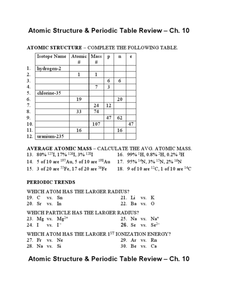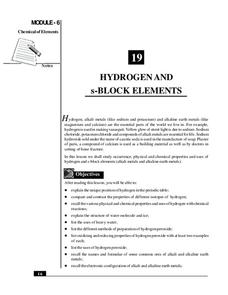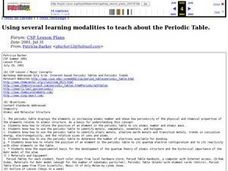Curated OER
Atomic Structure and Periodic Table Review
For this atomic structure and periodic table worksheet, students complete a table with isotopes, their atomic masses, the number of protons, neutrons and electrons and mass number. They also find the average atomic mass of atoms and...
Curated OER
The Periodic Table of Elements
Eleventh graders study the use of the periodic table to develop a better understanding of the chemical elements.
It's About Time
Organizing a Store
When provided with multiple objects, how many ways can the class organize and display them based on predetermined factors? Assist class members with a handy activity—theoretically teaching them concepts to understand periodic...
Curated OER
Organizing the Elements
Ninth graders examine the periodic table and discover why the elements in the table are organized the way they are through research. Students infer information about the elements and the relationships among them that leads to their...
Curated OER
Group 14, The Carbon Group
Six slides summarize the details about group 14 in the periodic table, otherwise known as the carbon group. Young chemists will see facts about carbon itself, and then some general uses of related metalloids. This is a short and basic...
Curated OER
Group 16, The Oxygen Group
The trends in group 16 and the characteristic behavior of the elements involved are listed here. Their properties also help support their function. Explanations of the atomic structure and valence electron number are not included. Since...
Curated OER
Periodic Trends
Thorough explanations of the trends in the periodic table of elements make up the majority of this handout. Atomic and ionic size, ionization energy, electron affinity, and electronegativity are presented before giving chemistry...
Mr. Jones's Science Class
Periodic Table Project
Don't be fooled by the title; this is not really a lesson on elements. It is a project on classification, using the periodic table as an example. For that reason, it could be used in any branch of science. As an example, a group may...
Kenan Fellows
What Element Would You Be?
Primo Levi wrote a collection of short stories comparing his life from Italy to Auschwitz to elements in the periodic table. Pupils read an excerpt from his book and research the characteristics of various elements. Then, they make a...
Curated OER
Periodic Behavior of Oxides
Students investigate the properties of oxides and observe their periodic trends. In this behavior of oxides lesson plan, students experiment with metallic oxides and non-metallic oxides to determine if they are acid, basic or amphoteric...
Curated OER
Physical and Chemical Trends in the Group 7 Elements
In this elements worksheet, students complete a graphic organizer by comparing the melting point, boiling point, density, and electronic configuration of given elements. Students determine the characteristics of Group 7 elements. This...
Curated OER
Trends in Physical Properties of Group 2 Elements
In this elements worksheet, students complete 2 graphic organizers by comparing the element symbol and melting point for given elements. Then students plot a graph of their atomic radius against proton number.
National Institute of Open Schooling
Hydrogen and s-Block Elements
Lesson 19 in the series of 36 analyzes the element hydrogen and the s-block elements. Through readings, answering questions, and discussion, learners write about and explain their occurrence, physical and chemical properties, and...
Curated OER
Periodic Trends
Students review how physical and chemical change while discussing the properties. They diagram the electron dot for the first four elements in the periodic table. Students identify elements and state what they know while investigating...
Curated OER
Periodic Trends
For this periodic trends worksheet, students determine the trends of electronegativity in the periodic table. Students compare electronegativity and ionization energy. This worksheet has 6 problems to solve.
Curated OER
Periodic Trends
Students explore the rationale behind the arrangement of the elements on the Periodic Table. Using internet and traditional research, students compare and contrast the properties of elements on the periodic table to determine a...
Curated OER
The Halogens
In this chemistry worksheet, students answer 24 questions related to properties of halogens. They fill in the table with the correct answers and participate in teacher demo.
Curated OER
Periodic Table Trends
In this periodic trends worksheet, students solve ten problems related to elements in the periodic table. Students write electron configurations for atoms and they compare elements and their periodic trends.
Curated OER
Periodic Table Quiz Review Sheet
In this periodic table activity, learners answer 10 questions about electronegativity, the groups of elements, atomic radius trends, electronegativity trends, ionization energy trends and properties of the elements.
Curated OER
Periodic Table & Its Trends-Day 1
Students are introduced to the periodic table. They find the common trends among the electron configurations and the names of certain groups of the table. Students explore the atomic mass, atomic number, mass number, mass and charge...
Curated OER
Periodic Table Patterns using Fabulous Periodic
Students explain how elements are arranged in the periodic table. In this chemistry lesson, students group the eggs according to a certain pattern. They compare this to elements in the periodic table.
Curated OER
Using several learning modalities to teach about the Periodic Table.
Students identify how to relate the position of an element in the periodic table to its atomic number and atomic mass. They identify how to use the periodic table to identify metals, semimetals, nonmetals, and halogens, and also,...
Curated OER
The Periodic Table
Eleventh graders examine the history and development of the periodic table and properties of elements. They complete worksheets, take notes during a teacher-led discussion, and produce their own periodic table.
Curated OER
Periodic Table & Its Trends
Students review atomic structure and then participate in a activity in which they categorize several "elements" into some form of order based on their properties. They discuss the trends they see. They also practice several electron...

























